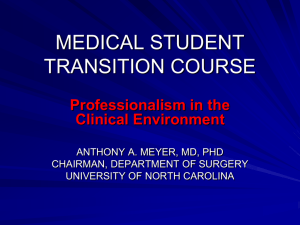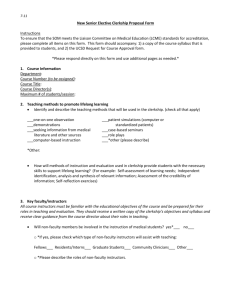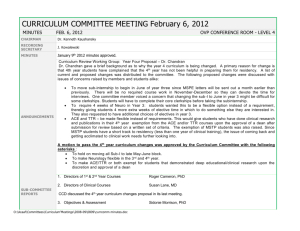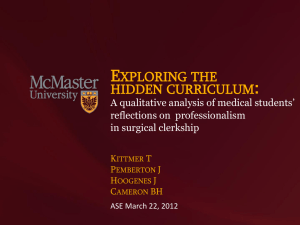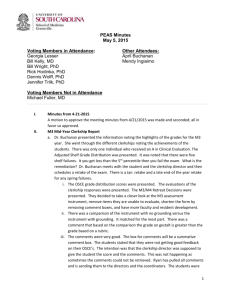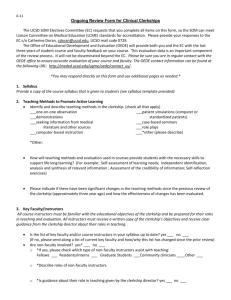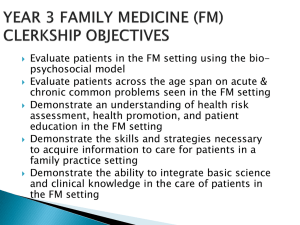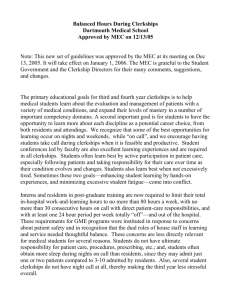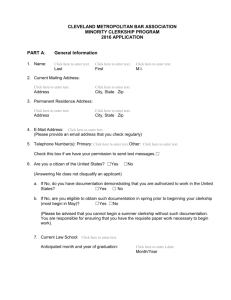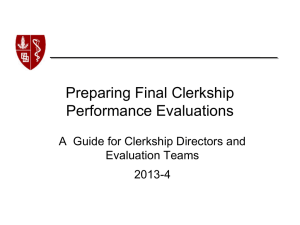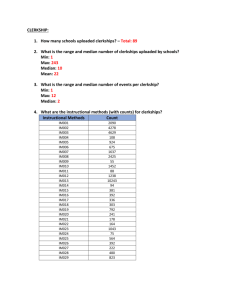Criterion-Based Evaluation Initiative (CBEI
advertisement
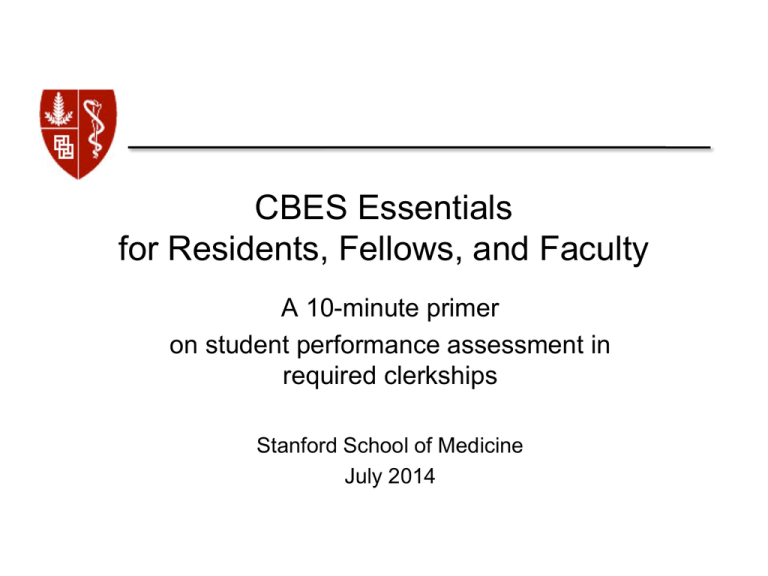
CBES Essentials for Residents, Fellows, and Faculty A 10-minute primer on student performance assessment in required clerkships Stanford School of Medicine July 2014 Contents 1. Criterion-based vs. norm-based evaluation 2. Criteria for PWD – – – 3. 4. 5. 6. 7. Exceptional Patient Care Exceptional Professionalism and Interpersonal Communication Final Exam Clerkship Evaluation Teams Role of resident, fellow, and faculty evaluators Fairness, Accuracy, & Timeliness Brief interactions More information Criterion- vs. Norm-based evaluation • Stanford’s performance evaluation system in required clerkships is criterion-based. • All students whose performance meets established criteria can earn a top grade of Pass with Distinction - regardless of how other students perform. • This is in contrast to a curved or norm-based system, where only a certain proportion of students can earn the top descriptor of performance. Pass with Distinction • Students may earn a Pass with Distinction in each of three domains: – Patient Care – Professionalism and Interpersonal Communication – Final Exam • Grades for each domain are reported separately in the MSPE Patient Care • The School of Medicine has adopted the RIME framework (Pangaro,1999) to describe performance in Patient Care. • The RIME framework is based on the understanding that students move through a sequence of developmental stages: – – – – Reporter Interpreter Manager Educator Click here for a more detailed description of RIME stages. Patient Care • Students must function in the Interpreter stage to pass each core clerkship. • Pass with Distinction requires functioning in the Manager stage. • Managers must consistently demonstrate strong Reporting and Interpreting skills. Expected Transitions MANAGER INTERPRETER REPORTER POM Core clerkship SubInternship Residency + Core clerkship students are expected to be in the Interpreter stage. Functioning as a Manager – during a required clerkship – earns a Pass with Distinction for Patient Care. Direct observation • As part of the required clerkship evaluation system, students are required to arrange direct observation of clinical skills by a resident, fellow, or faculty member. • Each clerkship has developed a form to guide direct observation. • Observers are not required to watch an entire H&P. Brief observation of part of an interview and/or exam will do. Professionalism/IPC • To earn a Pass with Distinction for Professionalism and Interpersonal Communication, students must demonstrate: – An absence of behavior that raises significant or consistent concerns – Consistent evidence of exceptional Professionalism and Interpersonal Communication with both patients and the medical team (See examples on the next slide.) • In addition, students must request multisource feedback from patients, peers, and non-MD staff Examples of Exceptional Professionalism and Interpersonal Communication Student: • Extends him/herself beyond usual duties to ensure patients' comfort or well-being • Advocates respectfully and diplomatically on behalf of patients • Serves as patients' preferred source of information and/or support • Makes an extra effort to support or help fellow students and others excel • Without prompting, takes on extra work to help the team/preceptor • Supports the team by paying attention to the needs and care plans of patients other than those assigned • Maintains composure and manages conflict in difficult situations • Makes an extra effort to participate in learning opportunities beyond those required • Seeks and responds openly and proactively to feedback • Demonstrates an advanced degree of personal responsibility and accountability– beyond being punctual and reliable. Final Exam • In clerkships using the NBME Subject Exam, an exam score between the 75th-80th percentile earns a Pass with Distinction for the final exam. • Clerkships using non-NBME exams have set comparable thresholds for Pass with Distinction. • Clinical application of knowledge and efforts to expand knowledge are assessed as part of Patient Care and Professionalism Clerkship Evaluation Teams • Each clerkship has established an Evaluation Team to review student performance data and assign final grades. • Evaluation Teams are required to submit final grades and evaluations within 4-6 weeks of the end of each rotation. Role of Residents, Fellows and Faculty • Individual residents, fellows, and faculty will not be asked to assign final grades or judge whether students should earn Pass with Distinction. • The role of each individual evaluator is to: – Respond promptly to requests for input on student performance – Describe observations of student performance – Provide real-time feedback to students based on observations of performance Requests for Input • Individual clerkships may use any or all of the following mechanisms to gather input on student performance: – – – – Electronic forms (E*Value) Paper forms Email Team meetings Evaluation Form • To link to the Patient Care Professionalism form used to collect resident and faculty input on student performance, see the CBEI Essential Information, Tools and Forms page Fairness, Accuracy & Timeliness • To ensure that student performance evaluations are as fair and accurate as possible, clerkships must collect information from the full range of residents, fellows, and faculty who work with each student. • Please respond promptly to clerkship directors’ and coordinators’ requests for information about student performance. Brief interactions Q: What if I didn’t have enough contact to decide whether a student functioned as a Manager or demonstrated exceptional professionalism? A note on brief interactions A: The role of each resident, fellow, or faculty evaluator is to describe observations of student performance. Clerkship Evaluation Teams will review and synthesize information to assign final grades. • Multiple brief observations from multiple evaluators will fall together as themes and trends. ALL input is valuable. More information • For more information, see the CBES website or contact one of the following people: – Elizabeth Stuart, MD, MSEd - Assistant Dean for Clerkship Education, aestuart@stanford.edu – Sara Clemons, MEd - Assistant Director for Clerkship Education, sclemons@stanford.edu • Thank you for your commitment to medical student education.
